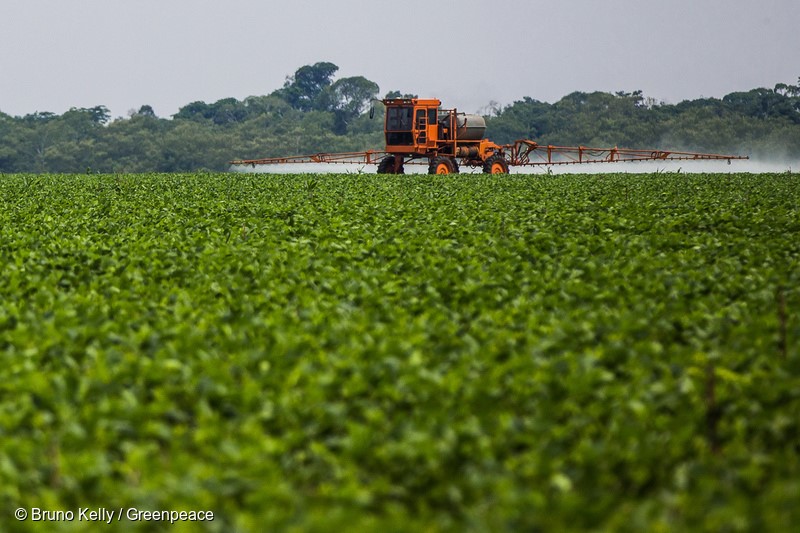Brussels, 6 December 2016 – The findings of new reports from the European Food Safety Authority (EFSA) and a recent decision by the European Commission should result in a ban of four bee-harming pesticides, according to three environmental and beekeeper organisations.
In a letter sent 5 December, Greenpeace, Pesticide Action Network Europe and Bee Life asked EU health commissioner Andriukaitis to end the EU licences of four pesticides (imidacloprid, clothianidin, fipronil and thiamethoxam) without delay. The Commission’s directorate general for Health and Food Safety is expected to share its thinking on how to deal with these pesticides at a meeting of the standing committee on Plants, Animals, Food and Feed starting 6 December.
Franziska Achterberg, EU food policy director of Greenpeace, said: “Evidence that these chemicals are toxic to bees has been mounting for years. Bees play a vital role as pollinators for countless plants, to lose them would be devastating. The European Commission must ban any chemicals that put our ecosystem in such danger, without further delay.”
Martin Dermine, bee project coordinator of PAN Europe, said: “The European Commission and member states have been giving a respite to these bee-toxic insecticides through the ‘confirmatory data procedure’. Evidence confirms neonicotinoids are toxic to bees and wildlife as a whole. It is more than time to ban them from our environment.”
Francesco Panella, president of Bee Life, said: “We beekeepers have been saying for 20 years that neonicotinoid insecticides are too risky for the environment. Some of the scientific proof of these risks dates from the year 2000. Now EFSA has come to confirm beekeepers’ views. We hope that member states trust the scientific competence of EFSA and the experience of beekeepers. The sooner we get rid of these insecticides from the environment, the better chance we have to evolve towards a balanced, life-based agriculture.”
Background:
On 8 November, EFSA issued two reports showing that the authorised uses of imidacloprid and clothianidin as seed coating and granules endanger the health of bees. [1] The conclusions were based on additional data submitted by the producers of these pesticides (Bayer CropScience and Sumitomo Chemical Agro Europe S.A.S.). In two earlier reports of 26 August 2015, EFSA concluded that other uses, such as spray applications after flowering, are also unsafe. [2]
In the case of fipronil, BASF did not supply the data needed to support a renewal of the EU licence. Instead of banning fipronil directly, the Commission and EU member states decided to allow its EU approval to expire on 30 September 2017. [3]
In the case of thiamethoxam, Syngenta failed to produce the additional studies needed to back up its current EU approval. [4] The Commission and EU member states have not yet taken any decision to end its EU approval.
The European Commission and member states had already restricted the uses of all four pesticides in 2013, based on findings by EFSA that certain uses harm bee health. The EU required that the producers of these substances submit ‘confirmatory information’ on aspects for which EFSA could not conclude its assessment. [5]
Notes:
[1] EFSA, 2016, Peer review of the pesticide risk assessment for the active substance imidacloprid in light of confirmatory data submitted, and EFSA, 2016, Peer reviews of the pesticide risk assessment for the active substance clothianidin in light of confirmatory data submitted.
[2] EFSA, 2015, Conclusions on the peer review of the pesticide risk assessment for bees for the active substances imidacloprid considering all uses other than seed treatments and granules, and EFSA, 2015, Conclusions on the peer review of the pesticide risk assessment for bees for the active substances clothianidin considering all uses other than seed treatments and granules
[3] Commission Implementing Regulation (EU) 2016/2035 of 21 November 2016
[5] Commission Implementing Regulation (EU) No 485/2013 of 24 May 2013 and Commission Implementing Regulation (EU) No 781/2013 of 14 August 2013
Contact:
Franziska Achterberg, food policy advisor at Greenpeace European Unit, [email protected], +32 498 362403
Martin Dermine, bee project coordinator at PAN Europe, , +32 486 329992
Noa Simon-Delso, scientific technical advisor at Bee Life, , +32 10 473416, +32 486 97 39 20
For breaking news and comment on EU affairs: www.twitter.com/GreenpeaceEU
Greenpeace is an independent global campaigning organisation that acts to change attitudes and behaviour, to protect and conserve the environment and to promote peace. Greenpeace does not accept donations from governments, the EU, businesses or political parties.

